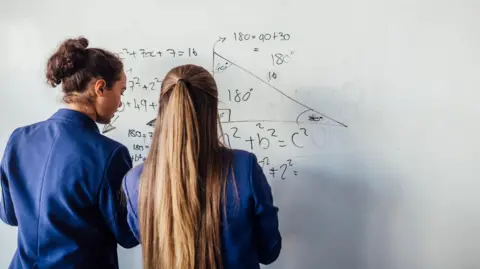Why was VAT added to private school fees?
 Getty Images
Getty ImagesAverage private school fees were 22% higher in January 2025 than in January 2024, according to the Independent Schools Council (ISC), which represents most independent schools in the UK.
The government introduced VAT on school fees in January to pay for more state school teachers in England.
But the ISC and a number of families have taken the government to the High Court over claims the policy is discriminatory and breaches human rights laws.
What is VAT and when was it added to private school fees?
Value added tax (VAT) is one of the government's main sources of income. It is payable on top of the purchase price of many goods and services. The standard rate of VAT is 20%.
Previously, private schools did not have to charge VAT on their fees because of an exemption for organisations providing education. That exemption was removed on 1 January.
About half of England's private schools are charities, which means that they also received an 80% reduction on business rates (taxes on properties used for commercial purposes).
The government removed that tax relief in April, but dropped earlier plans to scrap private schools' charitable status entirely.
How will the government spend the extra VAT raised?
The removal of the VAT exemption is UK-wide, but each nation will decide how to spend the additional money received.
The government estimates that the policy will raise an extra £460m in the 2024/25 financial year, rising to £1.7bn by 2029/30.
Chancellor Rachel Reeves said "every single penny" will go to state schools - including funding the recruitment of 6,500 new teachers in England.
Schools have been struggling to attract and retain qualified teachers for many years, especially in subject areas like maths and science.
The government also said there will be funding to address other issues in schools, such as crumbling buildings and delays in the system for children with special educational needs and disabilities (Send).
How much do private schools cost?
Private schools - sometimes called independent schools - charge fees for most students.
While some famous schools, like Eton and Harrow, charge about £50,000 a year, the average is about £15,000.
There are about 2,500 private schools in the UK, educating about 7% of all pupils, including about 570,000 in England.
Private schools have more freedom than government-funded state schools, and do not have to follow the national curriculum.
Some local authorities pay for children with special educational needs and disabilities (Send) to attend private schools.
Those that have a local authority education, health and care plan (EHCP) which names a specific private school that can meet their needs do not have to pay VAT.
The government also said a grant to help cover the boarding school fees for children of military families was increased to take account of the VAT increase.
Have private school fees gone up?
The ISC represents more than 1,400 private schools. It said its annual census showed average school fees were 22.6% higher in January 2025 than they had been in January 2024.
It blamed the "triple whammy" of higher national insurance contributions, an end to charitable business rates relief and the introduction of VAT.
The government had previously said it expected fees to rise by an average of around 10%.
In response to the ISC figures, a Treasury spokesperson said the increase was "not only down to VAT", and that private school fees had risen significantly in recent decades.
According to the the Institute for Fiscal Studies (IFS) think tank, average fees rose by 55% (after inflation) between 2003 and 2023.
However, the proportion of children being privately educated over the period did not fall.
Will the VAT changes mean the number of private pupils will fall?
When it announced the VAT increase, the government said it did not expect there to be a significant impact on the number of pupils attending private schools.
According to a Treasury memo seen by the BBC, initial estimates suggested that 54,000 pupils would be displaced, with most moving to state schools within the first two years.
However, the government now predicts that around 35,000 students will move to the state sector over a longer time period, and that class sizes will not increase.
It points to research by the IFS which said that state system could "easily accommodate extra pupils" because overall student numbers are set to fall by 700,000 by 2030.
That drop is larger than the total number of children currently attending private schools.
However, pupil numbers are not falling by the same amount everywhere, so some individual state schools could face pressure on class sizes.
It believes the government has underestimated the level of pupil displacement that will be caused.
Why was the VAT policy challenged in court?
The legal challenge was brought by the ISC, a smaller group of Christian faith schools, and parent-led group Education not Discrimination.
They argue that the policy goes against the legal right to an education, and claim it is discriminatory because it affects families attending low-paying faith schools.
The group also cites the effect on children with Send. Those who attend private school because their needs "cannot be adequately met in the state sector" but who do not have an EHCP have to pay VAT.
The court was told that the government had considered introducing the policy in September 2025, rather than in January.
But it rejected this idea because the main objective of the VAT change was to raise additional tax revenue to support the 94% of children who attend state schools, and any delay would have undermined that.
Government lawyers argued that families who wished to opt out of "the system of universally accessible, state-funded education" were free to send their children to private school or to educate them at home.
If the legal challenge is successful, the government could consider amending the policy, but would be under no obligation to do so.
